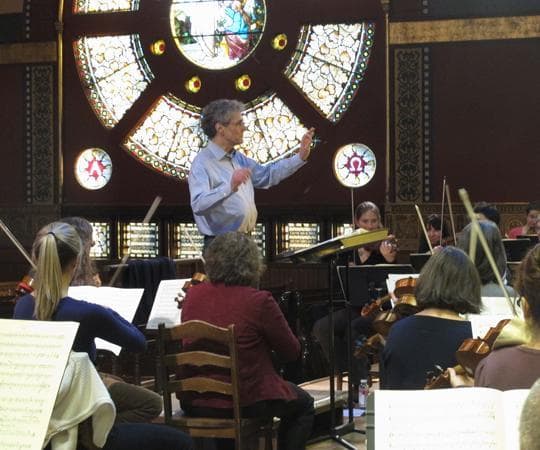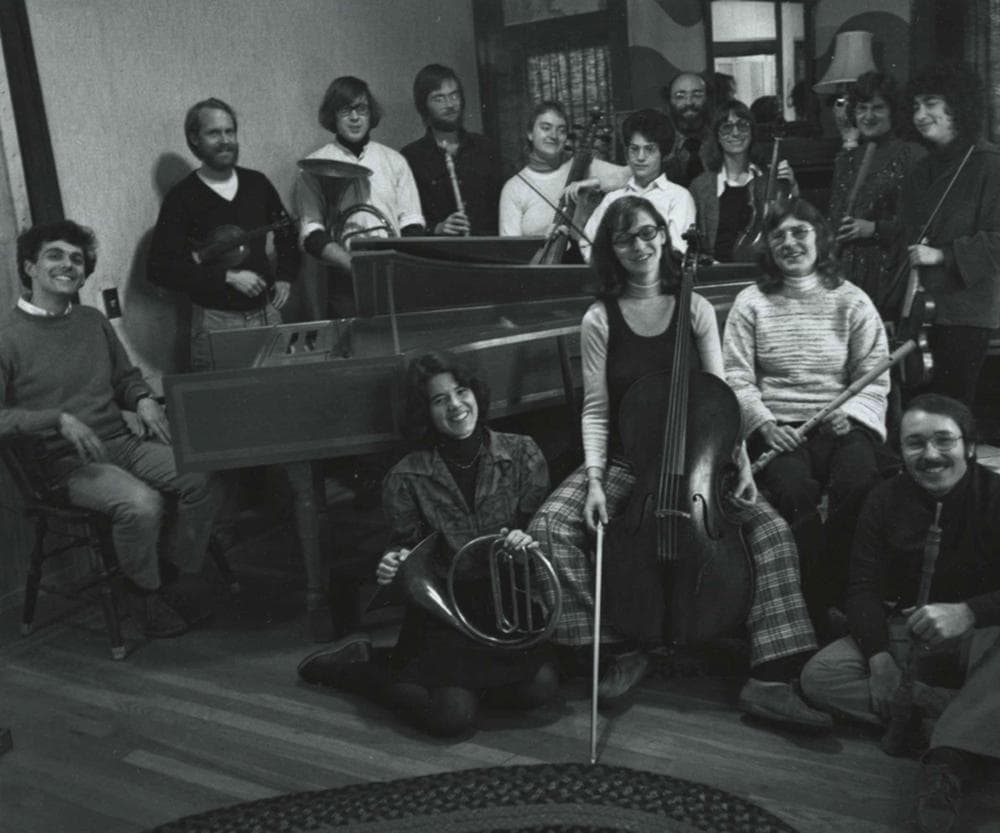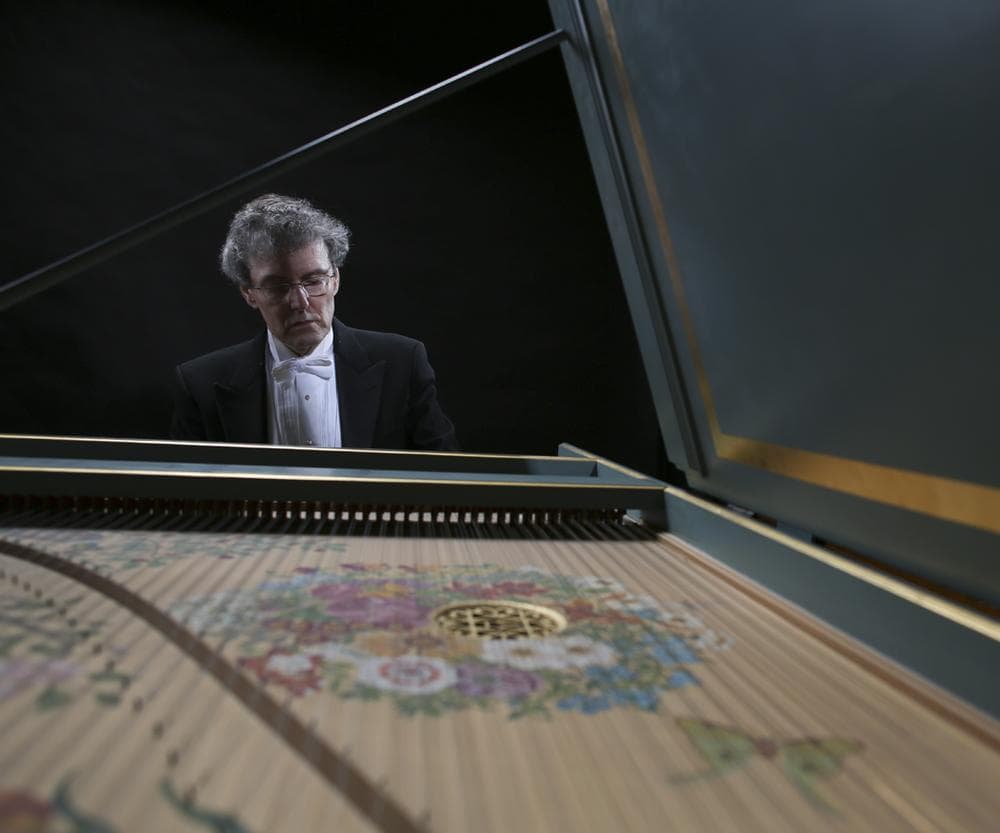Advertisement
For 40 Years, Boston Baroque Has Been Playing Far-Older Instruments
Boston Baroque, a homegrown early music orchestra, has been playing period instruments since 1973 — the first ensemble to do so in the U.S.
Plenty of people have never seen or heard these rare strings, brass and woodwinds in action, but Boston Baroque is displaying the orchestra's unique sound, look and prowess at three concerts this weekend for its 40th anniversary.
At a recent rehearsal at First Baptist Church in Newton Centre, nearly 60 musicians were preparing for something of a classical gauntlet: Beethoven’s "9th Symphony." It’s a sublime, but notoriously difficult, masterwork, and playing it on period instruments ups the ante.

On stage there were violins without chin rests, woodwinds without modern key systems and a brass horn that’s tough to identify. Musician Robin Pyle helped me out. “Well, it’s a trumpet,” he said with a laugh. "It doesn't look like a modern trumpet. It’s twice the length of a modern trumpet, no valves, so all of the pitch change we do with our lips.”
The trumpet valve was invented around the early 1800s. This means music written for trumpet before then was played with something similar to what Pyle held in his hands. He calls it a “treacherous beast.”
“It is difficult. It takes a lot more finesse than a modern trumpet,” he said. "With a modern trumpet if things go wrong you can sort of force your way through it and nobody will know, but with one of these, the minute you try to force, it’s going to bite back. And it gets ugly in a hurry.” Then he added: “It’s sort of the knuckleball of the early music instrument world.”

The period cello is no walk in the park either, according to Adrienne Hartzell. Its strings are made of beef gut, and there’s no end pin — the metal support stick you see at the bottom of modern cellos. For the Beethoven symphony, Hartzell will hold her original cello with her legs.
“It’s a long haul, 90 minutes without no end pin,” she said. “So you have to be physically in good condition.”
Hartzell started playing with Boston Baroque in 1973 amidst Boston's busing crisis, the aftermath of Vietnam and the lead-up to President Nixon’s resignation.
“We were hippies playing early music," she said. "Nobody really thought in those days about where is this really going because we weren't the Boston Symphony, and it was Marty’s creation, and we rehearsed in apartments in Cambridge, but Marty had a real vision that he has been able to really pull off over the years."

“I was initially just very curious," recalled Martin ("Marty") Pearlman, Boston Baroque’s founder. As a 20-something harpsichordist and Yale music graduate he first encountered period music played on period instruments when he travelled to Holland. It got Pearlman wondering.
"What it would sound like if we applied all these things we would read from back then, about how to play and use the instruments — what do you end up with?" he said.
To find out, Pearlman banded together a handful of musicians willing to learn how to play old instruments. He purchased two period trumpets and came up with the name Banchetto Musicale, or “musical banquet.” In January 1974 they performed their first concert in Cambridge.
“It was in a cold church and we filled it up," he remembered. "People were very interested to see what these instruments would sound like."
Boston Globe classical critic Richard Dyer was there, too. “You could see the breath of the performers, everybody was bundled up,” he said.
Dyer said period instrumentation was well on its way to becoming all the rage in Europe. Recordings of this new, more authentic approach to old, beloved works drove a rising segment of the classical music record market in Belgium, Austria and England.
“It was trendy in the '70s,” Dyer said, “but Martin Pearlman was in that first generation of people, and he was, at the time, pretty unique in doing this in this country.”

Other American groups followed, but what eventually became Boston Baroque kept growing.
“As people got better and better on the instruments, and as we had more of them, we could go into symphonies,” Pearlman said. "And I added a chorus so we could do all of the choral repertoire. Eventually we were doing opera.”
In 1984 Boston Baroque was the first period orchestra to perform at Carnegie Hall. The group landed a deal with Telarc Records in 1992 and made 20 albums. Pearlman has led a slew of period premieres.
Now Boston Baroque is tackling "Beethoven’s 9th" with a period-sized orchestra, which is smaller than what you would see if the BSO were playing the same piece at Symphony Hall.
Pearlman said the iconic, triumphant work is ideal for a period orchestra because it channels a sound closer to what audiences might’ve heard in Beethoven’s day. Like the brilliant but inscrutable composer aimed to do, the pairing also stretches the instruments’ limits.
“You feel that tension and that pressure and pushing the boundaries," Pearlman said. "And that’s very much part of a performance.”
And that’s what drives Boston Baroque, too, Pearlman believes. But the music director also acknowledges the challenges that come with keeping a 40-year-old Baroque orchestra fresh and young. So they’re using apps and cocktail socials to attract the under-40 crowd.
To kick off the 40th anniversary season, Boston Baroque performs tonight (Friday) and tomorrow night (Saturday) at the New England Conservatory’s Jordan Hall. There’s also a free show on Sunday at The Strand in Dorchester.
- You can listen to this story here:
This program aired on November 8, 2013. The audio for this program is not available.
